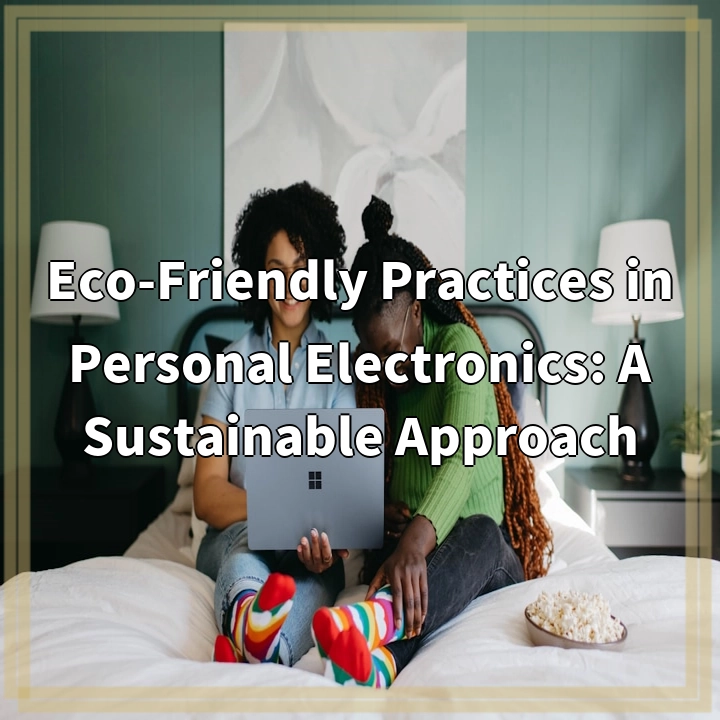Physical Address
304 North Cardinal St.
Dorchester Center, MA 02124
Physical Address
304 North Cardinal St.
Dorchester Center, MA 02124

Personal electronics, such as smartphones, tablets, laptops, and other consumer electronics, have become an integral part of our daily lives. However, their production, use, and disposal have significant environmental impacts. To address these issues, eco-friendly practices in personal electronics focus on adopting sustainable approaches throughout the lifecycle of these devices.
E-Waste: The improper disposal of personal electronics contributes to the growing problem of electronic waste or e-waste. Many devices contain hazardous materials, such as lead, mercury, and brominated flame retardants, which can pose risks to human health and the environment if not handled properly. E-waste also generates enormous amounts of electronic waste that end up in landfills or are illegally shipped to developing countries, leading to pollution and resource depletion.
Energy Consumption: The manufacturing and usage of personal electronics consume significant amounts of energy. From the extraction of raw materials to the assembly process and the energy required for device operation, the energy footprint of personal electronics is substantial. This energy consumption contributes to greenhouse gas emissions and exacerbates climate change.
Planned Obsolescence: Consumer electronics often face planned obsolescence, where companies design devices with a limited lifespan or intentionally make repairs difficult. This encourages consumers to replace their devices more frequently, leading to increased resource extraction, manufacturing, and waste generation.
Conflict Minerals: The production of personal electronics relies on the extraction of various minerals, such as tantalum, tin, tungsten, and gold. In some regions, these minerals may be sourced through conflict zones, leading to social and environmental issues, including human rights violations, child labor, and environmental degradation.
Supply Chain Transparency: The complex supply chains of personal electronics make it challenging to trace the origins of raw materials and ensure ethical and sustainable practices are followed. Lack of transparency in the supply chain can lead to the sourcing of materials from environmentally destructive mines or factories with poor labor conditions.
Overall, addressing these real-world problems associated with personal electronics is essential to promote a more sustainable and environmentally responsible approach in the electronics industry.
Recycling and Proper Disposal: Implementing effective e-waste recycling programs is crucial to reduce the environmental impact of personal electronics. Encouraging consumers to responsibly recycle their old devices and ensuring that proper disposal methods are accessible can help prevent hazardous materials from ending up in landfills or being improperly processed.
Extended Product Lifecycles: Designing personal electronics for durability and repairability can extend their lifespan and reduce the need for frequent replacements. Providing easy access to repair services, offering replacement parts, and promoting a culture of repair and maintenance can help minimize waste and resource consumption.
Energy Efficiency and Renewable Energy: Improving the energy efficiency of personal electronics through technological advancements can reduce overall energy consumption and carbon footprint. Incorporating renewable energy sources in the manufacturing process and encouraging users to charge their devices with clean energy can also contribute to a more sustainable approach.
Responsible Material Sourcing: Ensuring the responsible sourcing of materials used in personal electronics is crucial. Companies can prioritize suppliers that adhere to ethical and sustainable practices, promote transparency in their supply chains, and support initiatives that certify conflict-free minerals and responsible mining practices.
Consumer Awareness and Education: Raising awareness among consumers about the environmental impacts of personal electronics and the importance of eco-friendly practices is essential. Providing information about sustainable choices, guiding consumers on responsible disposal options, and encouraging them to make conscious decisions when purchasing new devices can drive positive change.
By implementing these solutions, we can make significant progress towards a more sustainable approach in the personal electronics industry and contribute to the preservation of the environment for future generations.
If you’re wondering where the article came from!
#